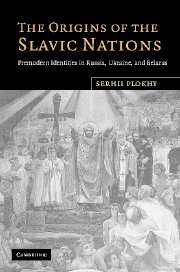Book contents
- Frontmatter
- Contents
- Preface
- Note on transliteration, dates, and translations
- Maps
- Introduction
- 1 The origins of Rus′
- 2 What happened to the Rus′ Land?
- 3 The Lithuanian solution
- 4 The rise of Muscovy
- 5 The making of the Ruthenian nation
- 6 Was there a reunification?
- 7 The invention of Russia
- 8 Ruthenia, Little Russia, Ukraine
- Conclusions
- Author index
- General index
Conclusions
Published online by Cambridge University Press: 25 July 2009
- Frontmatter
- Contents
- Preface
- Note on transliteration, dates, and translations
- Maps
- Introduction
- 1 The origins of Rus′
- 2 What happened to the Rus′ Land?
- 3 The Lithuanian solution
- 4 The rise of Muscovy
- 5 The making of the Ruthenian nation
- 6 Was there a reunification?
- 7 The invention of Russia
- 8 Ruthenia, Little Russia, Ukraine
- Conclusions
- Author index
- General index
Summary
“And they said, Go to, let us build us a city, and a tower, whose top may reach unto heaven; and let us make us a name, lest we be scattered abroad upon the face of the whole earth.” Such, according to the Old Testament (Gen. 11: 4), were the intentions of those who built the Tower of Babel. But their audacious disregard of God's will angered the Almighty, who punished the human race by dividing it into different lands and languages – an affliction that He considered second only to the Flood. The story of the Tower of Babel was a pillar of historical narrative throughout medieval Christendom. It also found its way into the Primary Chronicle, composed in the city of Kyiv at the turn of the twelfth century. The Kyivan princes were making a name for themselves in neighboring lands (the name was “Rus′”) and had a construction project of their own that involved the land, religion, and people of Rus′. If they hoped to reach heaven, it was by adopting and supporting Christianity in their realm. But the fate of their enterprise was not very different from that undertaken by the builders of the tower. In the mid-thirteenth century their state, weakened by internal strife, fell victim to Mongol invaders from the East. The Kyivan realm was divided, and in the long run its people developed literary languages and nations of their own.
- Type
- Chapter
- Information
- The Origins of the Slavic NationsPremodern Identities in Russia, Ukraine, and Belarus, pp. 354 - 362Publisher: Cambridge University PressPrint publication year: 2006



